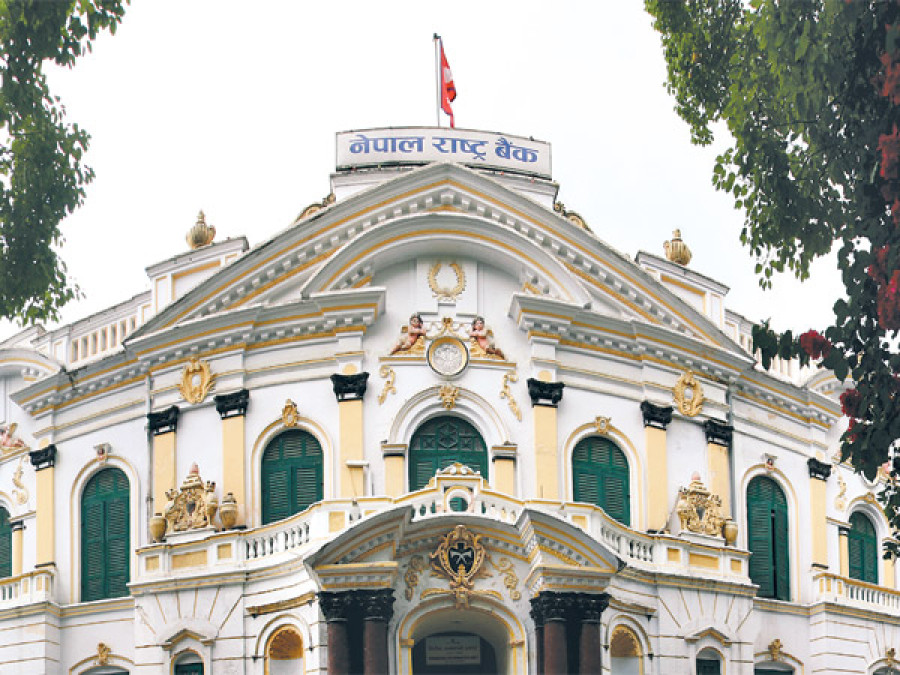Money
The Monetary Policy may not help stabilise interest rates, analysts say
Expanding credit can boost the amount of funds available for investment in the productive sector.
Rajesh Khanal
The Monetary Policy 2019-20 recently unveiled by Nepal Rastra Bank might not help stabilise interest rates in the long run as it has failed to introduce new measures and only focused on making minor changes in the existing policy tools, analysts said, speaking at a programme on Thursday.
Almost every year, the monetary policy makes small alterations to the traditional tools such as policy rate, open market operations and interest rate corridor as measures to address the liquidity crunch problem and stabilise interest rates. “These policies will only help regulate interest rates in the short term,” said Nar Bahadur Thapa, former executive director of Nepal Rastra Bank.
Lowering the interest rate corridor and changing the spread rate, cash reserve ratio, standing lending facility, refinancing rate and bank rate are among the measures that the central bank inserts in almost every policy, according to Thapa.
The central bank, in its monetary policy, has aimed to improve the liquidity position among banks by enforcing a number of measures such as permitting them to take loans from hedge funds and pension funds abroad. In addition, the policy has made it mandatory for banks to issue debentures equivalent to 25 percent of their paid-up capital by mid-July 2020.
Banks have been allowed to collect fixed deposits from foreign citizens and non-resident Nepalis with a minimum maturity period of two years. According to stockbrokers, all these measures can help improve the capacity of banks to extend credit even to secondary market investors.
Nepal Rastra Bank has expanded projected credit to the government by 24 percent, up from the last fiscal year's target of 22.5 percent. Similarly, it has extended the projected loan amount to the private sector by 1 percentage point to 21 percent. Expanding credit for the government and the private sector can boost the amount of funds available for investment in the productive sector.
“All these monetary and financial measures are thus targeted at managing loanable funds and meet the growth target of the government,” said Thapa. According to him, the central bank considers these measures to be optimal monetary measures to address stability and growth issues in the Nepali economy.
Thapa sought the need for implementing modern policy tools such as quantitative and qualitative easing and long-term asset purchase programmes to stabilise interest rates in the long term, which many countries have started doing through the monetary policy.
Under quantitative easing, the central bank purchases government securities or other securities from the market in order to increase the money supply and encourage lending and investment. In qualitative easing, the central bank deliberately reduces the average quality of the assets to back the monetary base.
Similarly, asset purchase programmes allow the central bank to purchase credit instruments from a certain market segment only. “These measures can help stabilise the interest rate problem recurring in Nepal almost every year,” said Thapa.
The private sector has criticised the monetary policy by stating that it is only designed to aid the government achieve the targeted economic growth rate of 8.5 percent per annum. “However, the measures that the policy has enforced will hardly reduce soaring interest rates, the main cause behind the rise in the cost of funds,” said Shekhar Golchha, senior vice-president of the Federation of Nepalese Chambers of Commerce and Industry.
For the past few years, Nepal has been recording a growth rate of 6 percent per annum on average. For this reason, demand for loans has surged significantly, leading banks to issue credit surpassing their deposit collection. This has pushed up the interest rate on loans.
Golchha said the provision making it mandatory for banks to issue debentures equivalent to 25 percent of their paid-up capital would raise interest rates further. “Currently, banks have been offering more than 10 percent interest on debentures. Under the new provision, they must hike the interest rate to ensure their competitiveness in the market,” said Golchha.
Krishna Prasad Dahal, lawmaker and chairman of the parliamentary Finance Committee, said the policy favoured banks by seeking to increase the supply of loanable funds.
“But there are few provisions to boost the country’s production business,” he said.
***
What do you think?
Dear reader, we’d like to hear from you. We regularly publish letters to the editor on contemporary issues or direct responses to something the Post has recently published. Please send your letters to [email protected] with "Letter to the Editor" in the subject line. Please include your name, location, and a contact address so one of our editors can reach out to you.




 9.83°C Kathmandu
9.83°C Kathmandu















